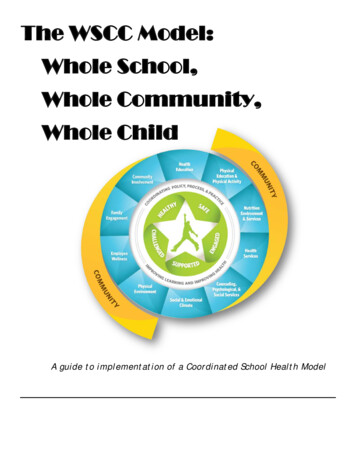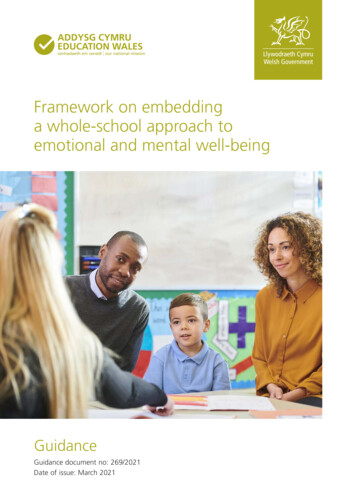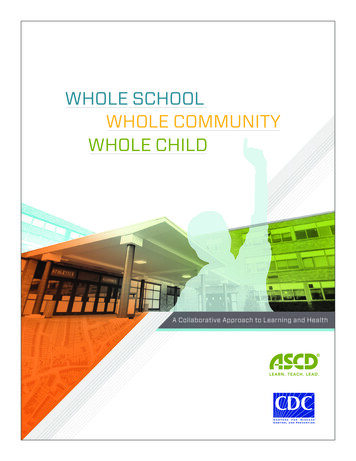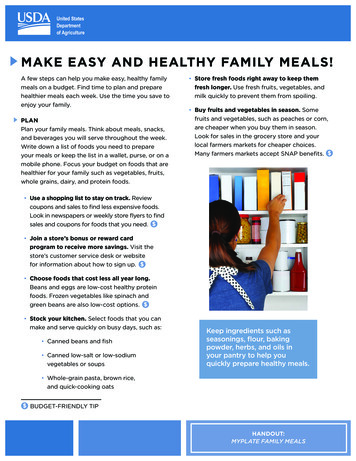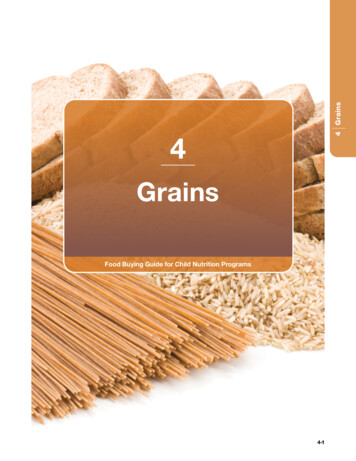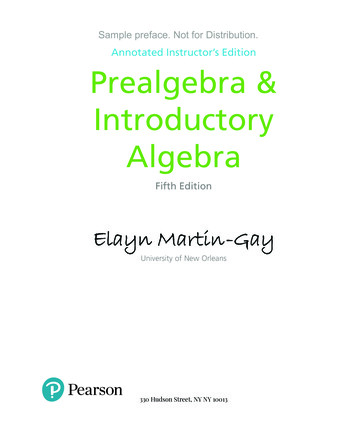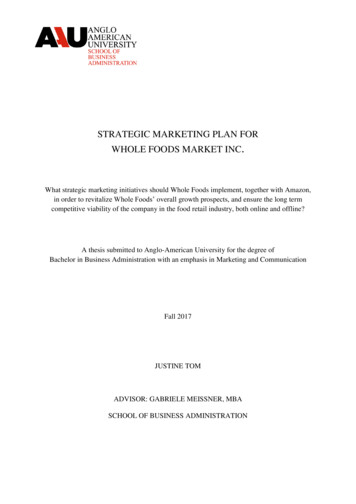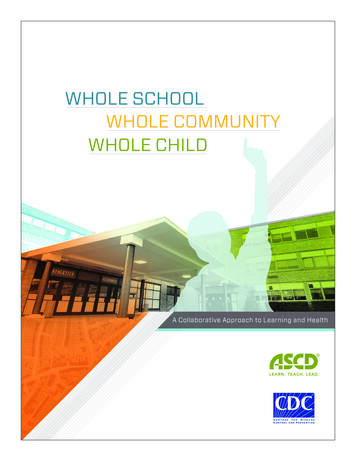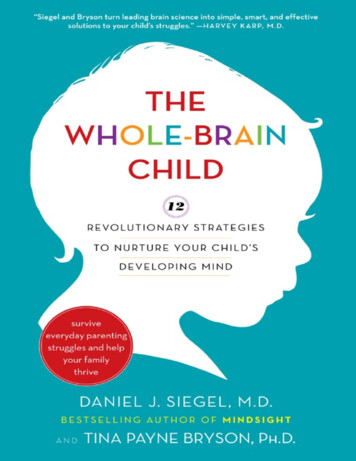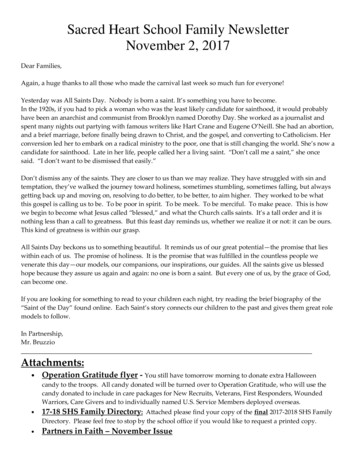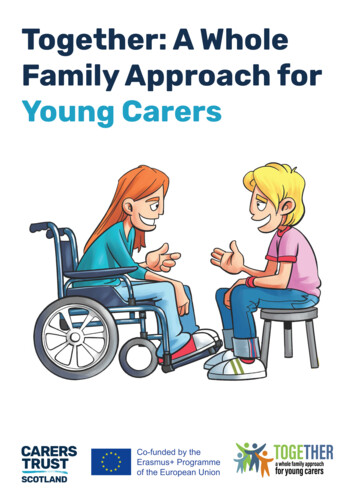
Transcription
Together: A WholeFamily Approach forYoung Carers
ACKNOWLEDGEMENTSThis resource has been produced by Carers Trust Scotland as an output of the Europeanproject, Together: A Whole Family Approach for Young Carers. Carers Trust Scotland is gratefulto the European Commission through the Erasmus Programme for its generous support,which has made this resource possible.We would also like to thank the Scottish Young Carers Services Alliance and the Young AdultCarer Advisory Group for their support in shaping this resource.Carers Trust ScotlandSpacesTay House300 Bath StreetGlasgow G2 4JRTel: 0300 772 7701Email: scotland@carers.orgCarers.org Carers Trust 2020. Illustrations Alex Leonard.Carers Trust is a registered charity in England and Wales (1145181) and in Scotland(SC042870). Registered as a company limited by guarantee in England and Wales No. 7697170.Registered office: Carers Trust, Unit 101, 164-180 Union Street, London SE1 0LH
CONTENTSTogether project background 4Why is working with the whole family so important? 5Practical steps: 7Guide to having difficult conversations for practitioners7Facilitating open dialogue within families10Young Carer Statement12Recording outcomes for the whole family13About Carers Trust ScotlandCarers Trust Scotland is part of Carers Trust, a major charity for, with andabout carers. We work to improve support, services and recognition foranyone living with the challenges of caring, unpaid, for a family member orfriend who is ill, frail, disabled or has mental health or addiction problems.With locally based Network Partners we are able to support carers in thecommunity with information, advice, emotional support, hands on practical help and accessto much needed breaks. We offer specialist services for carers of people of all ages andconditions and a range of individually tailored support and group activities.Together: A Whole Family Approach for Young Carers 3
TOGETHER PROJECT BACKGROUNDCarers Trust Scotland is part of an Erasmus funded Together: A Whole Family Approach forYoung Carers project, with partners based in Belgium, Germany, Greece and Italy. The projectaims to raise awareness of young carers and to support them and their families.The project’s ultimate goal is to have a positive impact on families in order to support youngcarers; reducing any negative impacts caring responsibilities can bring and improving youngpeople’s wellbeing, social inclusion and community engagement.This will be done by helping young carers, their families and practitioners to adopt a wholefamily approach, where family members (including the person being cared for) are encouragedto communicate openly about the caring relationship.Aim of the resourceThe aim of this resource is to support practitioners in adopting a whole family approach. Itprovides practical steps and guidance to refer to and possibly adopt into your own practice.It is designed to support and complement the work practitioners already do across Scotland,with flexibility to help you use the steps and guidance in your own work. Ultimately, lastingpositive change and support is more sustainable when working with the whole family.Although the terminology and legislation referred to in this document applies toScotland the experiences, challenges and recommendations are applicable acrossthe whole of the UK.4
WHY IS WORKING WITH THE WHOLE FAMILYSO IMPORTANT?No other way to work than a whole familyapproach.Young carer workerAbout young carers and young adult carersA young carer is someone under 18 who helps look after someone in their family, or afriend, who is ill, disabled, has a mental health condition or misuses drugs or alcohol.Young people who are aged 16–25 and care, unpaid, for a family member or friend are knownas young adult carers.A whole family approachAdopting a whole family approach involves practitioners supporting young carersin the context of their families. Identifying young carers’ needs and considering theimpact of caring responsibilities on the whole family, and what personalised support isrequired ensures that inappropriate caring does not take place. This holistic approachensures that appropriate support is provided and promotes open dialogue withinfamilies about the caring relationship.Inappropriate caring has a huge impact on young carers’ health and wellbeing. A substantialfactor that can contribute to this is a lack of communication within the family. Where familiesdo not openly talk about the caring relationship, caring responsibilities may be taken onwithout a discussion about free choice. Where parents don’t regularly talk to their childrenabout their needs and give them the chance to signal feelings of stress and overload, youngpeople will suffer under the caring role.Lack of communication in the family home may also be due to a lack of awareness andidentification of young carers; resulting in many remaining hidden and unsupported. Manyfamilies may not recognise their children as ‘carers’, some children and young people do notrecognise or identify with the label, and there can be a degree of reluctance, even anxiety,among families in disclosing caring responsibilities.Adopting a whole family approach is therefore vital to ensure that young carers and theirfamilies are identified, fully supported and empowered.Together: A Whole Family Approach for Young Carers 5
The Carers (Scotland) Act 2016The Carers (Scotland) Act 2016 was launched in April 2018 with the keyaim of identifying carers and providing appropriate support. The key dutyin the Act is that carers who meet eligibility criteria must be provided withsupport to meet their identified needs. When carers do not meet eligibilitycriteria for support, local authorities must set out how they will meetthose needs.Under the Carers (Scotland) Act 2016, young carers in Scotland have the right to a YoungCarer Statement. The Act specifies there must be certain things included in support planningfor carers, such as emergency and future planning, the carer’s personal outcomes, how muchcare the carer is willing and able to provide, and whether any support could include a breakfrom caring. This reflects a preventative approach to identify the personal outcomes of eachcarer and provide appropriate support, information and advice.As a practitioner, adopting a whole family approach supports you in achieving your dutyunder the Carers (Scotland) Act 2016 further. Encouraging open dialogue raises awarenesswith family members about the impact caring roles can have on young people’s lives. Itcontributes to tackling stigma that some families still feel towards caring and the involvementof services in their lives. This approach also provides the information and advice families mayneed, empowering them to seek out the support that can help them. Ultimately, adopting thisapproach ensures that young carers are not taking on inappropriate caring responsibilities,allowing them to be able to live their own life alongside their caring role.6
PRACTICAL STEPSGuide to having difficult conversations for practitionersA lack of communication in the family home may be due to a lack of awareness andidentification of young carers. As a practitioner, you can initiate these conversations and raiseawareness with members of the family, to ensure that inappropriate caring does not takeplace.Speaking with family members to help them understand what young caring looks like andthe impact it could be having, may be a difficult conversation to have. Some families feelembarrassment or stigma attached to the involvement of services in their lives. It can also bedifficult for young carers, who may want to have a more open conversation with their familiesbut find this uncomfortable or awkward.Equipped to have that conversation is a difficultask of practitioners, often you are commentingon how people are living their family lives.Young carer workerWhen having that initial conversation with families, consider: Using services’ involvement in a positive light, and reinforcing to families that furtherinformation and support is available to help them.Yes caring has an impact on the young person’s life,but we as a service are here to support them withthis. As a family, you can support one another too.Family worker Having information and advice on hand for families – it is important to remember thatthere is no ‘one size fits all’ approach. Families are all varied, and it is important to have anawareness of this when supporting young carers. Recognition of caring roles and the need for greater support can make a huge difference tofamilies. Whether your role is to primarily support young carers, giving family members thechance to discuss their experiences can establish good working relationships and breakdown stigma they may feel towards services’ involvement.Together: A Whole Family Approach for Young Carers 7
Family members may be upset. Discussing caring roles in a family can be difficult and it isimportant to stress that it is OK to be emotional. Conflict within families. The resource Equal Partners in Care refers to conflict and tensionsarising in families. This resource is a great tool to reflect on your own communication asa practitioner and offers tips to help facilitate these conversations when there is conflictinvolved. Please note that not all situations will be safe to involve family members and childprotection and safeguarding must take precedence. Different family relationships and the impact of services’ involvement on these in thelong term. How are young carers feeling about their family members? How can theseconversations ensure that all family members are comfortable?8
Useful resourcesNHS Education for Scotland and Scottish Social Services Council: EqualPartners in d-care-zone/carers/equalpartners-in-carePerth and Kinross Association of Voluntary Service (PKAVS): Guidance Notesfor notes.pdfSkills for Care: Working with nt family structuresFamilies Outside: Supporting Families Affected by CC: Children and Families at ilies-at-riskOne Parent Families Scotlandhttps://opfs.org.uk/Scottish Families Affected by Alcohol and Drugshttps://www.sfad.org.uk/The Children’s e-working-with-young-carersWorking Familieshttps://workingfamilies.org.uk/Together: A Whole Family Approach for Young Carers 9
Facilitating open dialogue within familiesSome family members may find it difficult to accept that a young person in their family is ayoung carer. In addition to having those initial conversations, resources can also be shared tohelp contribute to a greater understanding of what young caring looks like and the impact itcould be having on their young family member.I struggle to speak to my family as I see them on adaily basis so it’s awkward.Young carerResources can also help practitioners who may have limited capacity to work directly withfamilies. Signposting families to useful resources can help raise awareness of who youngcarers are and the impact this role could be having.Let’s Stay Together project resourcesCarers Trust Scotland: Caring within the Family: Starting thatConversation, TogetherWe have created conversation cards, with the help of members of our YoungAdult Carer Advisory Group. Our conversation cards are easy to use forstarting meaningful conversations about the impact caring roles are having in the family.They can be used together as a family or used individually to reflect on key questions. Eachcard has one discussion point on one side, and information on the other! Visit Carers.org/resources/all-resources.Partner ResourcesPartners in the project have also created key resources to help raise awareness of youngcarers and the impact of caring roles in the family. You can find these resources at https://togethereuproject.eu/.Useful resourcesConnecting Young Carers: Is your Child a Young e-do/our-publications.aspxSibs: Helping Parents Support Young s/Young Carers Edinburgh: We Care, Do You?www.youtube.com/watch?v wUDpvR7IrlY&feature youtu.beYoung Scot: What Does a Young Carer Look -does-a-young-carer-look-like
Fallin Primary in Stirling hosted a ‘Bounce BackBreakfast’ to welcome children and families back toschool after the new year. This was an opportunityfor the school, families and local partners to getto know each other and for families to know moreabout what support is available in their localcommunity. Stirling Young Carers service wereinvited along to this event to raise awareness ofyoung carers and their service. This was a greatopportunity for whole families to gain more insightinto the needs of young carers and supportavailable both locally and nationally.Young carer serviceLearning about specific conditionsResources written for young people can also help support young carers in learning more aboutthe illness or condition of the person they care for. We’ve given some examples below butcontact any charity which supports people with a particular condition to see what they haveproduced for young carers.MS Society: MS in Your Life - a Guide for Young -in-your-life-a-guide-for-young-carers-bookletMND Buddieswww.mndbuddies.org/Living with Huntington’s Disease: A Guide for Young People Aged 13 Living-with-Huntingtons-disease-13.pdfGuide to Parkinson’s for port/guide-parkinsons-teenagersAs a service, we always ask young people what they needand use these organisations and resources to providepersonalised support and information. Young carers oftenwant clear communication and a strong understanding ofthe condition or illness of their cared-for person. We supportyoung carers to initiate that conversation with their families.These resources can help prepare everyone for that.Young carer serviceTogether: A Whole Family Approach for Young Carers 11
Young Carer StatementYoung Carer StatementA Young Carer Statement consists of an outcomes based conversation about theyoung carer’s personal circumstances. It must include information on the impact ofcaring on their wellbeing and whether the care provided is appropriate.Local authorities have a duty under the Carers (Scotland) Act 2016 to provide a Young CarerStatement to young carers. This ensures that young carers are identified, their needs areassessed and ultimately, inappropriate caring is prevented.This duty provides the opportunity for practitioners to engage with young carers about theirfamily relationships and facilitate open dialogue in the home. Small steps to adopt a wholefamily approach include the types of questions being asked at initial referral stage, andpractical ways to speak with families about caring roles.When carrying out a Young Carer Statement, consider: Providing a safe space for young people to share their experiences and opinions privately,particularly if there are differences of opinion in the household. Asking young carers if they would like to involve family members at this initial stage.Remember that young carers have ownership of their Young Carer Statement, so it isimportant to ask young people what they would like. Offering the opportunity for membersof the family to have their say and share their experiences can help practitioners work withthe whole family to decide on meaningful, personalised actions to support all. What information will support the wellbeing of the whole family as well as the youngcarer? A consideration of the needs of the carer and the person they care for, and whatappropriate support is required, ensures practitioners adopt a holistic view.Good practice examplesGlasgow City Health and Social Care Partnership: Young Carer Strategy 2019/2022.Delivering Better Outcomes for Young Carers and their 19%20-%2022 1 0 0.pdfPerth and Kinross Council and Perth and Kinross Association of Voluntary Services(PKAVS): Young Carer th-and-kinross-young-carers12
Recording outcomes for the whole familyPersonal outcomes approachThrough the Young Carer Statement, practitioners ensure that personal outcomes that matterto young people are identified and recorded, and that appropriate support is put in place.Practitioners can build on this personal outcomes approach when supporting the wholefamily.Recording personalised outcomes ensures that initial conversations with a family are not onlyrecorded, but actions are taken that provide personalised and effective support.The starting point is the initial conversation with family members, with open discussions toidentify what is important and planning activities and/or support from there. Responding tothe needs of the family should never overshadow the needs of the young carer. This approachcan instead complement the personal outcomes approach that practitioners already adoptwhen carrying out a Young Carer Statement.Actions taken are of course dependent on staff capacity but shouldalways adopt a holistic view. It may include referral to adult supportservices, or young carer services for siblings. It could be empoweringyoung carers to learn more about the specific illness or condition andsupporting the family to have those conversations. Running wholefamily workshops may provide families with the space they needto be supported by practitioners in having difficult and, at times,uncomfortable conversations. Find out more about running workshopsat https://togethereuproject.eu/.It is crucial that any action taken is later reviewed and evaluated. When evaluating the impactof services’ involvement in family life, consider: Reviewing support plans within agreed timeframes with all family members. Honestyand trust are essential to this process in that families must be empowered to speakopenly about their progress and give honest feedback (see Cook, A and Miller, E (2012),Talking Points: Personal Outcomes Approach: A Practical Guide for Organisations (JointImprovement Team). Your role as a reflective practitioner including writing up case studies of working withfamilies and reviewing the learning that has occurred. Could you share these case studieswith colleagues? What role could networking opportunities play here, for example with theScottish Young Carers Services Alliance? A range of evidence – an important factor in the process. Using stories and quotesalongside data reinforces the impact of this work.Together: A Whole Family Approach for Young Carers 13
Family action planThis action plan can be developed alongside a Young Carer Statement orduring whole family workshops.Practitioners can use this action plan to take note of issues, perspectivesand experiences of all individuals, and develop key actions to support thewhole family.The wording used in this action plan is strength-based; focussing on what matters toindividuals within a family and what support would help strengthen this. It is important thatthis plan includes jargon free language to support a shared understanding.Remember that reviewing this action plan within agreed timescales is crucial.What matters to our family? What planned activities/support do we need?14Have our agreed actionsbeen achieved?
Useful resourcesScottish Social Services Council: Understanding Personal Outcomeshttps://learn.sssc.uk.com/personal outcomes/Personal Outcomesbooklet p2 FV GM.pdfTalking Points: Personal Outcomes Approach, A Practical Guide forOrganisationswww.academia.edu/1854811/Talking Points Personal Outcomes Approach A PracticalGuide for OrganisationsThe Learning Exchange: Welcome to the Outcomes e Family Pathway: A Resource for ault/files/2020-10/whole familypathway 2016 1st 1 .pdfTogether: A Whole Family Approach for Young Carers 15
Carers Trust ScotlandSpacesTay House300 Bath StreetGlasgow G2 4JRTel: 0300 772 7701Email: ust Carers Trust 2020. Illustrations Alex Leonard.Carers Trust is a registered charity in England and Wales (1145181) and in Scotland(SC042870). Registered as a company limited by guarantee in England and Wales No. 7697170.Registered office: Carers Trust, Unit 101, 164-180 Union Street, London SE1 0LH.
Conversation, Together We have created conversation cards, with the help of members of our Young Adult Carer Advisory Group. Our conversation cards are easy to use for starting meaningful conversations about the impact caring roles are having in the family. They can be used together as a family or used individually to reflect on key questions. Each
